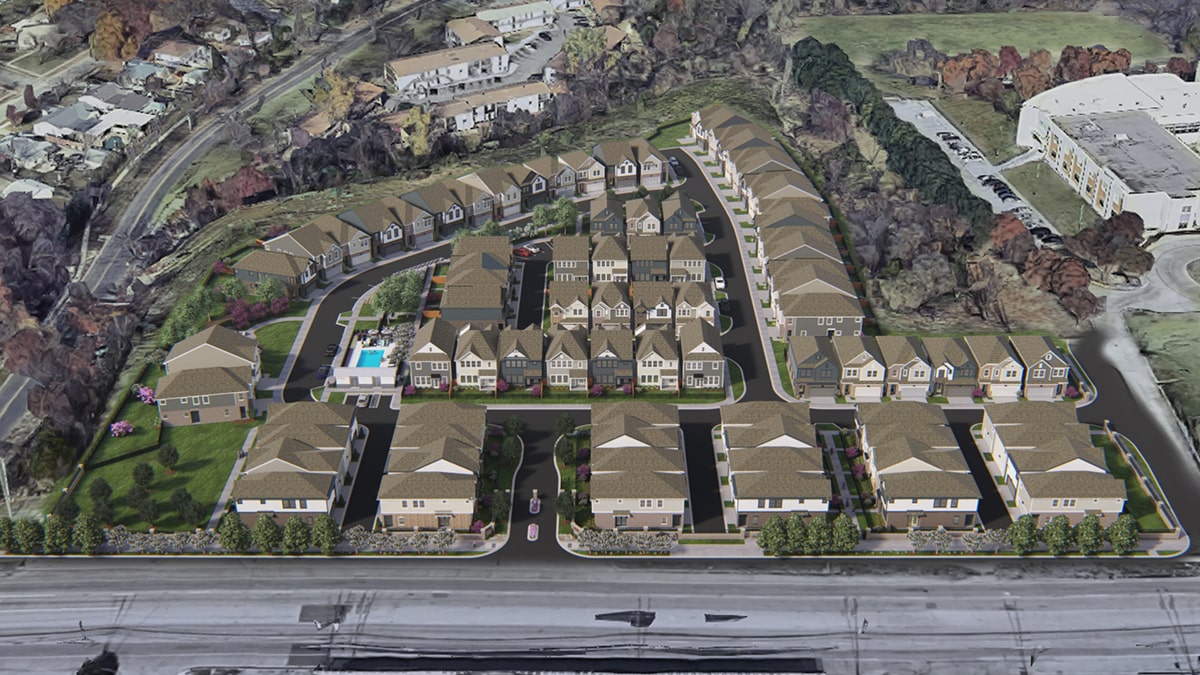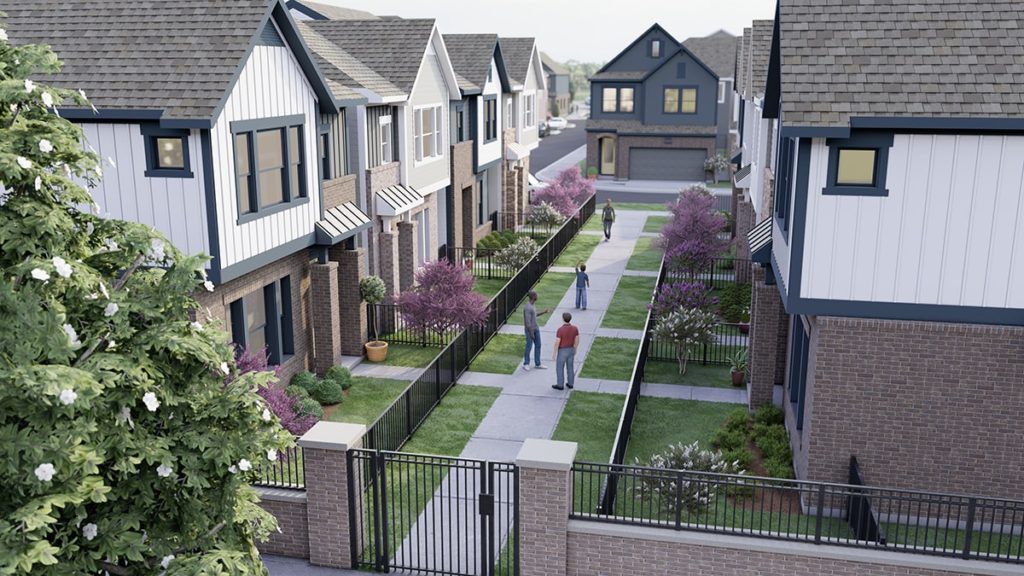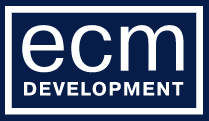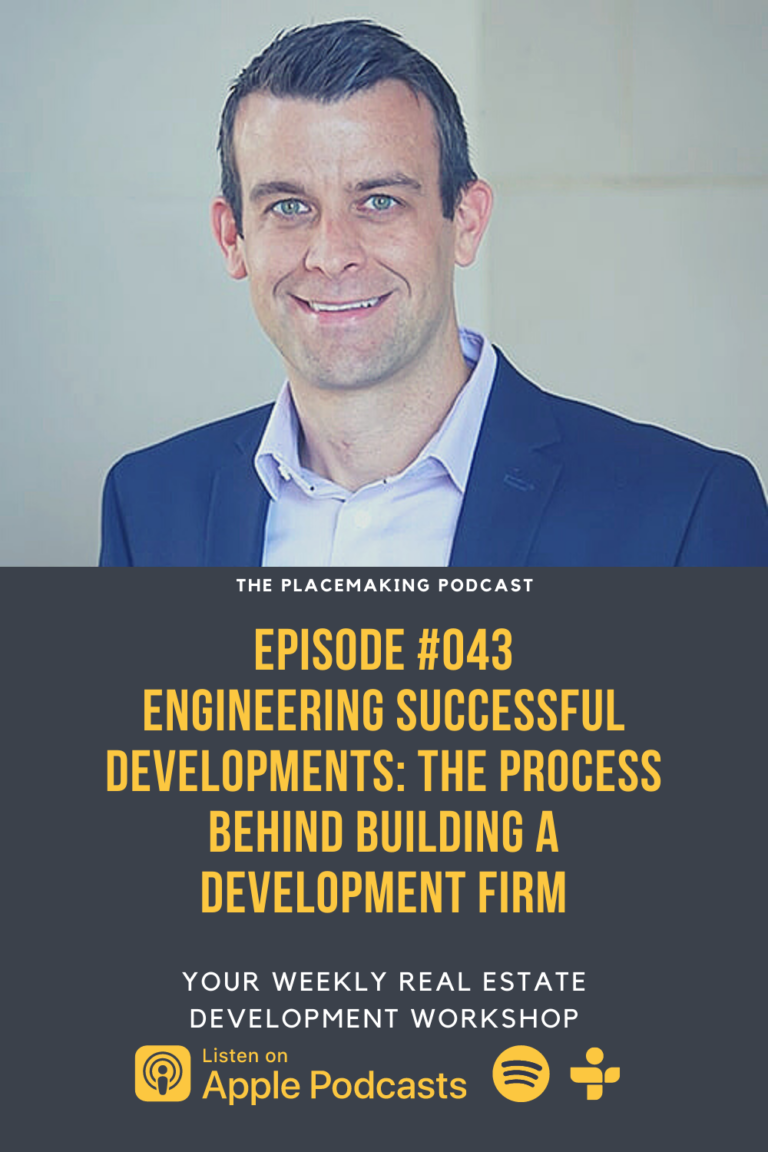- placemakingpodcast@gmail.com
Engineering Successful Developments: The Process Behind Building a Development Firm with TJ Moore – Ep. 43
About the Guest
Another amazing episode of the show is coming your way! I am excited to share this next conversation with all of you. TJ is a Partner and President of ECM Development in Arlington, Texas. Born and raised in Arlington Texas, TJ Moore is a civil engineer who fell in love with land development. After getting his undergraduate degree in civil engineering from the University of Texas at Arlington, TJ worked for Graham Associates Engineering where he designed over 3,000 residential lots and several multifamily developments. He then decided to pursue a career in land development with David Weekley Homes. There he gained experience and cultivated his passion developing over 1,100 lots, specializing in high-density urban infill. In early 2019, TJ created his own development company, ECM Development.
The guiding philosophy for ECM Development is to design and construct high-quality communities that create value, provide homes for a diverse population, and exceed every expectation of project stakeholders. They aim to achieve superior returns for their investors while mitigating the risk with a diversified portfolio of projects ranging from fee simple lot development to single-family rental communities. Every day they strive to live out their mission of creating value to restore hope by knowing Him and making Him known.
In this episode, we are going to discuss the lessons TJ learned in transitioning from an engineer to founder of a real estate development firm, the role of single-family for-rent developments in commercial real estate, and the ways that ECM diversifies itself from the competition and other asset types. There is loads of great information in this episode and I greatly appreciated TJ for taking the time out of his extremely busy schedule to discuss this topic of single-family rental real estate development with me.
As always, if you have enjoyed the show, please subscribe to the show and share it with your friends in the industry. There will be more exciting conversations on the shows to come.
Main Take-Away’s From This Show
This was another really fun episode to record. TJ has an interesting, but not all to unique, background in Civil Engineering. He took that understanding in the horizontal realm of development and built on it by learning about debt, equity, vertical construction, and so much more. He noticed a real need in the community to provide for-rent single-family developments to the DFW metroplex. TJ decided to take a leap of faith and founded ECM Development in 2019 to fill this need. There were so many great talking points that TJ shared throughout the discussion, so it is hard to just pick three for my main take-away’s this week. The following main topics of the show come from an understanding in the real estate development processes that TJ possesses.
- It’s about the WHO, not the WHAT.
- Single Family For-Rent Developments Provide Another Alternative to Traditional Multifamily Developments.
- Creating Processes in Real Estate Development is Absolutely Crucial.
As always, I will dig into each of these “take-away’s” every week on the blog. So, without further a due, here we go!

It’s about the WHO, not the WHAT.
Real estate development is a people-business, plain and simple. TJ recognized this early in his career and lived by the principle of “It’s about the WHO not the WHAT” in all of the practices relating to his business. The beauty of this statement is in its simplicity. TJ has used this guiding principle successfully in steering his company closer to ECM’s Mission Statement every day.
The ”WHO” mentioned can be anyone from subcontractors to staff to investors in the business. In order to truly embody this principle, you have to understand not only who you do business with, but with whom you do it for. There is a subtle difference here. You not only want to do business with people you trust, but you also want to remember who you are doing all this work for. Who are the end-users? Who are the stakeholder’s involved? What looks like success to them?
In real estate development, if you make the wrong choice on who is involved in your project, it can cost you. This can be true for partners, design team, and contractors. In order to be successful in the business, it pays to pay for excellent consultants because if you don’t do so in the beginning, you could ultimately make up for it in the end through change orders, litigation, and delays. Needless to say, I love this main point. I think it is extremely valuable and could potentially save you a lot of headaches and heartaches as you pursue a career in real estate development.
Single Family For-Rent Developments Provide Another Alternative to Traditional Multifamily Developments.
Single Family For-Rent development has become very popular in various metros across the U.S. Essentially this looks very much like a single-family residential development, however all of the single-family units are for rent not for sale. The developments are typically all part of one single lot but as mentioned, they have the appearance of providing separate lots with separate backyards. They also typically provide amenities such as common areas, swimming pools, and other various recreational facilities similar to that of a typical multifamily development.
The main draw for developers to this type of asset class includes the security of continuous cash flow that comes from for-rent product. They also can typically provide a much greater density than that of typical single-family lots because they don’t require setbacks in between each lot because it’s all one single lot. This allows for greater scale and concentration. The tenants that live in these types of developments also tend to be more stable and less transient than typical multifamily tenants. This allows for less turnover and greater stability in incomes.
Tenants of these types of developments tend to favor their own personal yards. Maybe they have a dog or two and find value in providing a yard for their four-legged friends. They may also have trouble affording a home in the infill area that most of TJ’s developments occur in.

They find it more attractive to pay less in rent than deal with homeownership. They often want the experience of living in a multifamily development such as the amenities and property management without the frustration of sharing a ceiling or wall with another person. All of these reasons have culminated to make single-family for-rent developments much more common in the last couple of years.
Creating Processes in Real Estate Development is Absolutely Crucial.
This last main point is one that I have not heard often from many of the developers I have interviewed, however, it seems extremely important, nonetheless. When you are dealing with a process-driven exercise like real estate development, understanding the “next steps” in every project should be top of mind when tackling each one. I found it extremely interesting to hear how TJ and his team pulled together the processes for each one of their product types so that everyone along the chain knew exactly what needed to be done next. As mentioned, coming up with the various processes is not a fun procedure by any means but has paid off dividends for TJ and his company.
In real estate development, there are many processes. However, they tend to take place in a semi-predictable fashion when thinking about entitlements, design, and construction. Obviously, you can’t predict every eventuality, but you can most. By writing out these processes, you can make training that much easier for new hires. You can potentially reduce errors. Or in the case that TJ mentioned, you can make the potential to recommit those errors much less with the emergence of a set of processes that can be updated, as necessary. Again, I love this last main point. I think it could honestly save you money and heartache down the road if you go through the initial unpleasantness of creating the processes.
As you can see from the takeaways above, this podcast episode was absolutely full of amazing information on making it in real estate development and certainly provides actionable steps you can take on your next real estate development project. As always, if you have enjoyed the content and the show, please subscribe to the show below and share it with your friends in the industry! We’ll have many more great discussions on the shows to come.
To Learn More About TJ Moore and ECM Development, Check out the Following Websites:
- LinkedIn – TJ Moore
- LinkedIn – ECM Development
- ECM Development Website

Recommended Reading Section
P.S. We spend (a lot) of time, sweat, tears, and money creating each episode of The Placemaking Podcast. We do this without the support of sponsors as we want to keep the advertisements out of the picture and provide an add-free listening experience. YOUR support ensures we can keep delivering these discussions ad-free!
If you feel compelled to donate to the show (and receive some cool bonuses…) you can check out my Patron Page.
The Placemaking Podcast
All Rights Reserved © 2020
Podcast: Play in new window | Download (Duration: 49:02 — 26.1MB) | Embed
Subscribe: Apple Podcasts | Spotify | TuneIn | RSS | More







